In the memories of many generations of Vietnamese people, the image of children "crawling" in the communal house yard, home yard, countryside corner, street corner... engrossed in playing hopscotch, singing nursery rhymes loudly is a whole sky of childhood full of simplicity and purity: "Betel and areca rows/ Are rows of girls/ Cake and fruit rows/ Are rows of old women/ Incense and flower rows/ Are rows of offerings to Buddha..."
Nowadays, some folk games are no longer strange images appearing only in documentaries or textbooks, but are gradually returning to modern life, especially in classrooms, cultural tourism areas and even in young families.
 |
Folk games have appeared quite popularly in summer activities. |
Compared to the past, today's game sets are meticulously crafted; extracurricular activities recreate the old village space... showing that folk games are not forgotten but have somehow revived in their own way, in harmony with modern life.
That return is both a traditional entertainment activity and a sign of a cultural trend with the inspiration of finding memories so that people can find connection with each other and with the community in the most natural way.
 |
Children are instructed on the rules of the game. |
In some clubs such as "Reading with Children" founded by Doctor of Education Nguyen Thuy Anh or "Little Pen" of teacher Duong Hang, the living space for children, in addition to books, lessons, articles... also has space for folk games.
The clubs have proactively created a cultural space imbued with traditional values for children to relax and directly experience folk games such as: mandarin square, blindfolded goat catching, dragon snake up to the clouds, making handmade toys, etc.
 |
The Chinese checkers game set is neatly and aesthetically packaged. |
Under the enthusiastic guidance of teachers, collaborators and volunteers, many games that seemed to have faded into the past have now "revived" with excitement, helping children practice thinking, learn how to coordinate, share and connect. These activities have contributed to preserving the national cultural memory, while nurturing in children a love for old but still meaningful values.
Contributing to the liveliness of spaces, in places like Sinh Duoc Cooperative (Gia Vien, Ninh Binh ), the restoration of folk games is carried out in a very careful, meticulous and dedicated manner.
 |
Members of Sinh Duoc Cooperative play Chinese checkers to relax after work. |
Each set of games from Chinese checkers to other traditional games are meticulously designed aesthetically, using natural materials, safe for children and packaged in a familiar, rustic but sophisticated form. Cooperatives such as Sinh Duoc often do not consider this as a commercial product but as a cultural responsibility, so they have proactively subsidized, promoted, given gifts... so that the game sets can reach children all over the country.
Mr. Vu Trung Duc, Chairman of Sinh Duoc Cooperative shared: "Making play sets for children is not the main production activity of the cooperative members, but everyone is eager to spread the beautiful memories of their childhood to today's children. Each pebble eroded by stream water over the years is carefully selected and processed by the people before packaging. They are like small works that help children have fun, nurture their souls, teach them how to share, consider and believe in simple values".
 |
Along with folk games, children are encouraged to read books. |
Teacher Duong Hang, founder of the Little Pen Club, expressed her joy at accompanying children with folk games: "When letting children play, we always have clear and close instructions to help children understand the rules of the game, learn how to wait for their turn, respect their friends and know how to behave properly while playing. The values of discipline, patience and team spirit are instilled in children naturally through each turn of play. This is one of the important values that folk games bring, both familiar and deeply educational."
Huu Phuong, a student of the Little Pen Club, happily shared: "The other day my teacher gave me a set of Chinese checkers. I really liked it because the pieces are round, smooth pebbles of various colors. She also taught us how to play and sing nursery rhymes. This summer, I will bring the set of games to play with my siblings and neighbors. I want everyone to have fun and learn how to give in and unite with each other when playing."
 |
Relaxing moments with folk games after school. |
Recently, within the framework of the "Experience Vietnamese - Travel around the world" Festival in Frankfurt (Federal Republic of Germany) organized by the Vietnamese Consulate General in collaboration with the Reading with Children Club and the Vietnamese Sunshine Class, the "Folk Game Wharf" initiated by Dr. Nguyen Thuy Anh herself became an interesting and emotional highlight.
Here, in addition to traditional games such as throwing con, shuttlecock kicking, hopscotch, etc., children can also play bamboo dragonflies - a traditional toy imbued with the Vietnamese countryside. The dragonflies, balanced yet precariously on the fingertips, arouse curiosity and interest, opening the door for children to enter the world of traditional crafts of the nation.
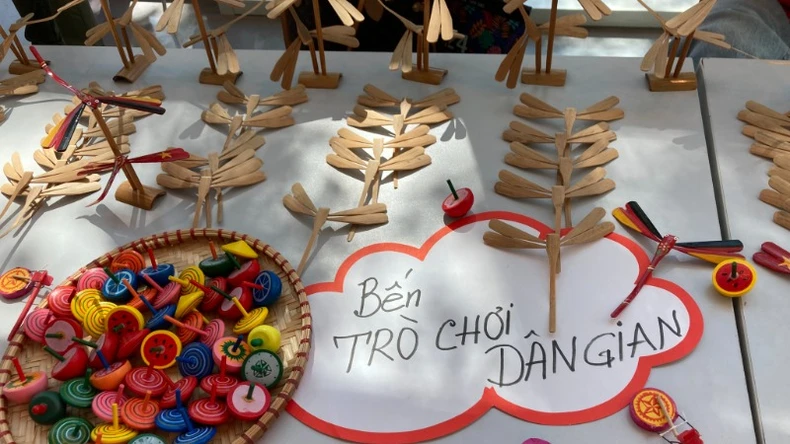 |
Folk games organized by Dr. Thuy Anh abroad. |
Under the guidance of Dr. Thuy Anh and volunteers, Vietnamese children abroad decorated dragonflies with their favorite colors and patterns, inspired by Vietnamese culture.
Dr. Nguyen Thuy Anh shared that traditional games and toys are also a way to help children "touch" Vietnamese in a more vivid way, through movement, interaction and emotional connection. Not only is Vietnamese a language of communication, it is also a language of culture, of memories and affection, so activities like "Folk Game Wharf" have brought Vietnamese closer to the young hearts of children far away from the Fatherland.
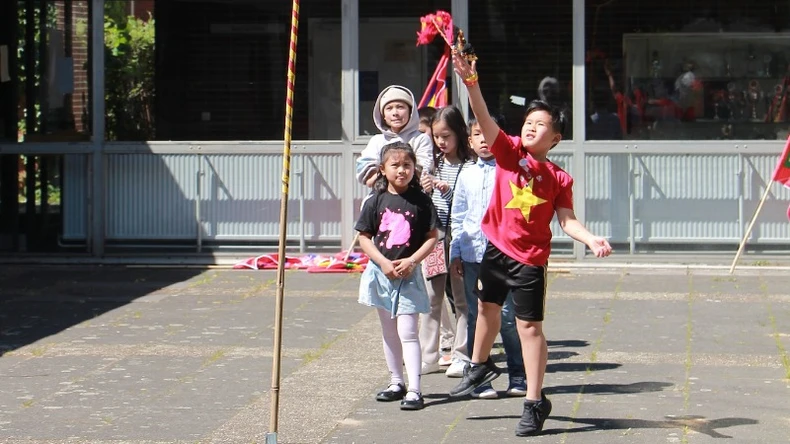 |
Vietnamese children abroad play shuttlecock throwing. |
The trend of returning to folk games has many profound positive meanings, especially in the context of increasingly strong modernization and globalization. Reviving and maintaining traditional games helps to preserve and conserve the nation's unique cultural values, contributing to building folk cultural identity in contemporary life.
In addition, folk games are also a healthy form of entertainment, creating a natural educational environment, helping children develop thinking and social skills, such as: teamwork, patience, sharing and respect for the rules of the game. Organizing and guiding the playing of folk games in clubs, schools or communities contributes to promoting the connection between generations, creating a space for cultural and emotional exchange, helping children today understand and appreciate their roots.
 |
Folk games bring many valuable lessons in life. |
More and more folk game sets are being made with aesthetic, safety and subsidized criteria to reach many children, especially in disadvantaged areas. This trend shows deep social concern, contributing to enriching the spiritual life of the young generation.
Education experts say the return of traditional games is not simply a nostalgia for the past, but shows that modern society is beginning to find a balance between technology and traditional culture. In the context of children spending more and more time on screens, bringing back old games not only helps preserve national cultural identity but also nourishes children's souls with simple but precious things.
Source: https://nhandan.vn/hoi-sinh-tro-choi-dan-gian-trong-nhip-song-hien-dai-post882332.html


![[Photo] Lam Dong: Close-up of illegal lake with broken wall](https://vphoto.vietnam.vn/thumb/1200x675/vietnam/resource/IMAGE/2025/11/03/1762166057849_a5018a8dcbd5478b1ec4-jpg.webp)
![[Photo] General Secretary To Lam receives Singaporean Ambassador Jaya Ratnam](https://vphoto.vietnam.vn/thumb/1200x675/vietnam/resource/IMAGE/2025/11/03/1762171461424_a1-bnd-5309-9100-jpg.webp)
![[Photo] Prime Minister Pham Minh Chinh receives the Chairman of the Japan-Vietnam Friendship Association in the Kansai region](https://vphoto.vietnam.vn/thumb/1200x675/vietnam/resource/IMAGE/2025/11/03/1762176259003_ndo_br_dsc-9224-jpg.webp)

![[Photo] Fall Fair 2025 and impressive records](https://vphoto.vietnam.vn/thumb/1200x675/vietnam/resource/IMAGE/2025/11/03/1762180761230_ndo_br_tk-hcmt-15-jpg.webp)
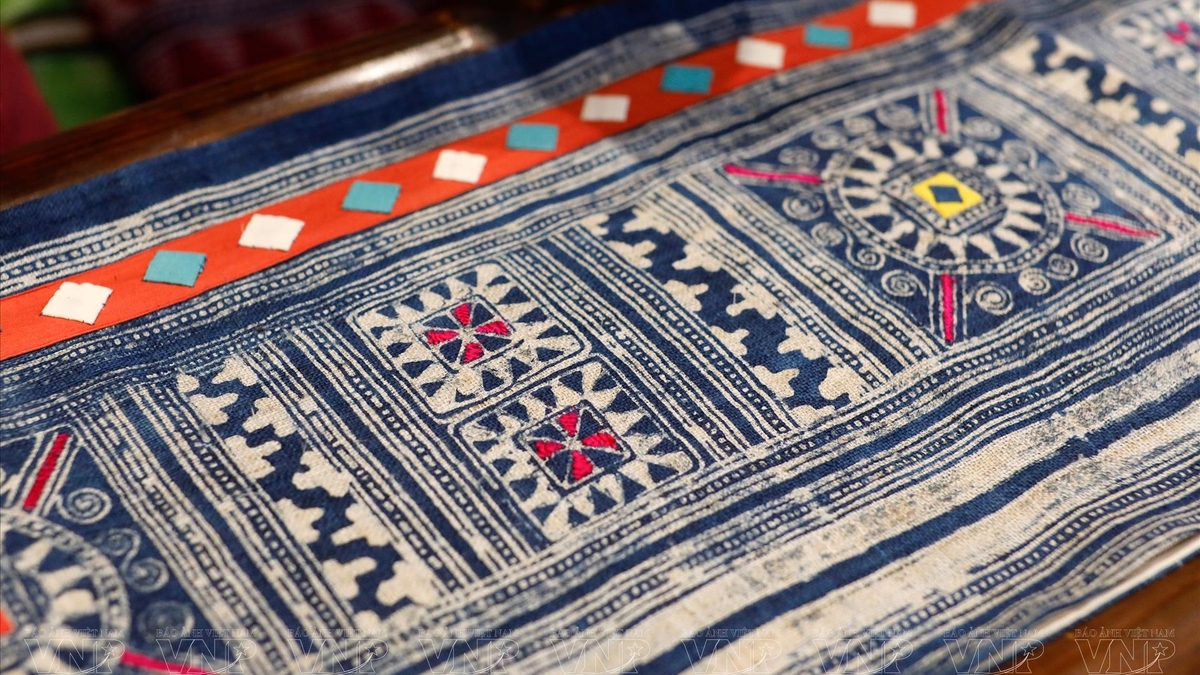
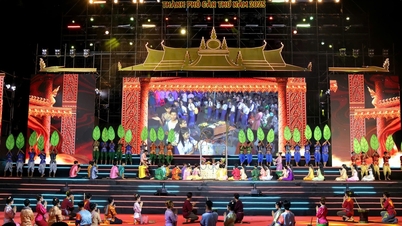

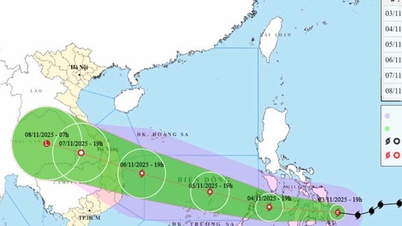

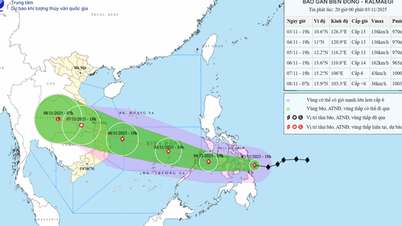














![[Photo] Fall Fair 2025 and impressive records](https://vphoto.vietnam.vn/thumb/402x226/vietnam/resource/IMAGE/2025/11/03/1762180761230_ndo_br_tk-hcmt-15-jpg.webp)
![[Video] Digital transformation and artificial intelligence: the breakthrough development platform of modern medicine](https://vphoto.vietnam.vn/thumb/402x226/vietnam/resource/IMAGE/2025/11/03/1762180464388_hoi-nghi-khoa-hoc-benh-vien-bach-mai-8223-jpg.webp)














































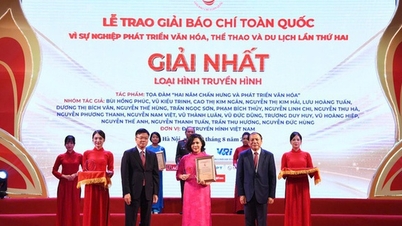





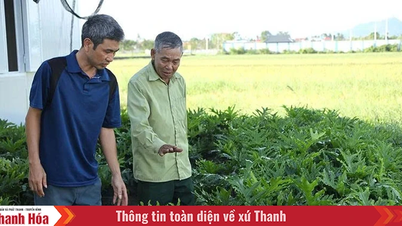




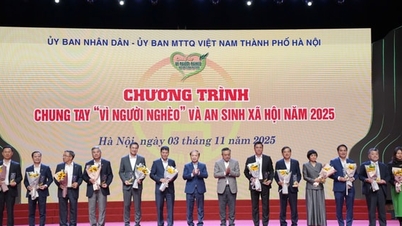
















Comment (0)